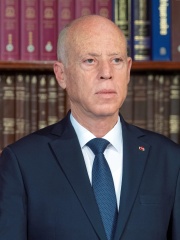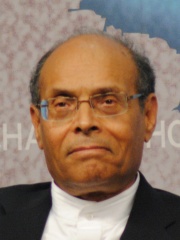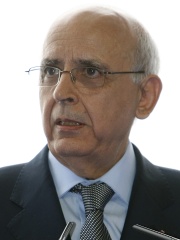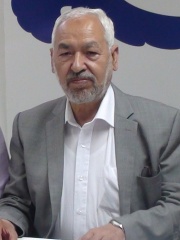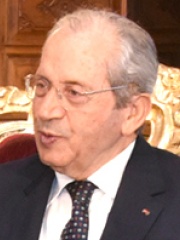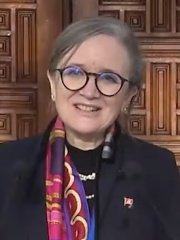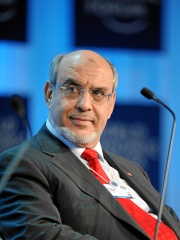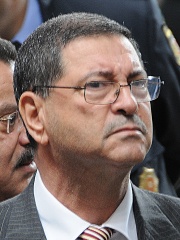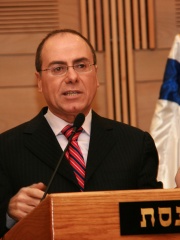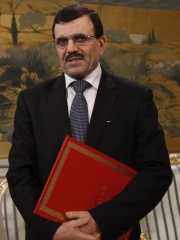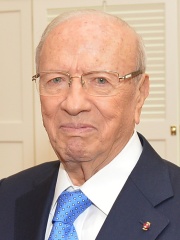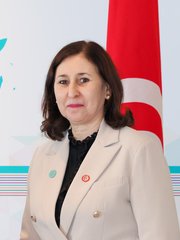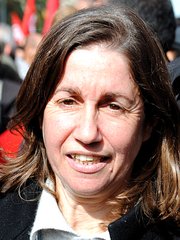
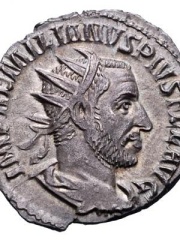
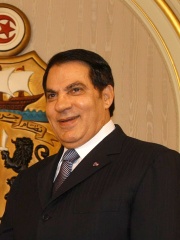
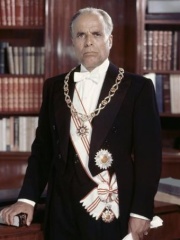
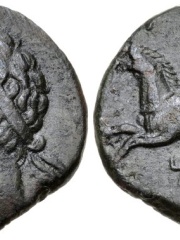
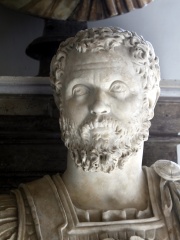

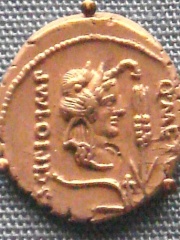
The Most Famous
POLITICIANS from Tunisia
This page contains a list of the greatest Tunisian Politicians. The pantheon dataset contains 19,576 Politicians, 59 of which were born in Tunisia. This makes Tunisia the birth place of the 59th most number of Politicians behind Uruguay, and Colombia.
Top 10
The following people are considered by Pantheon to be the top 10 most legendary Tunisian Politicians of all time. This list of famous Tunisian Politicians is sorted by HPI (Historical Popularity Index), a metric that aggregates information on a biography's online popularity. Visit the rankings page to view the entire list of Tunisian Politicians.

1. Hannibal (247 BC - 183 BC)
With an HPI of 86.62, Hannibal is the most famous Tunisian Politician. His biography has been translated into 114 different languages on wikipedia.
Hannibal (; Punic: 𐤇𐤍𐤁𐤏𐤋, romanized: Ḥanībaʿl; 247 – between 183 and 181 BC) was a Carthaginian general and statesman who commanded the forces of Carthage in their battle against the Roman Republic during the Second Punic War. Hannibal lived during a period of great tension in the Mediterranean Basin, triggered by the emergence of the Roman Republic as a great power with its defeat of Carthage in the First Punic War. Revanchism prevailed in Carthage, symbolized by the pledge that Hannibal made to his father to "never be a friend of Rome". In 218 BC Hannibal attacked Saguntum (modern Sagunto, Spain), an ally of Rome in Hispania, sparking the Second Punic War. Hannibal invaded Italy by crossing the Alps with North African war elephants. In his first few years in Italy, as the leader of a Carthaginian and partially Celtic army, he won a succession of victories at the Battle of Ticinus, Trebia, Lake Trasimene, and Cannae, inflicting heavy losses on the Romans. Hannibal was distinguished for his ability to determine both his and his opponent's respective strengths and weaknesses, and to plan battles accordingly. His well-planned strategies allowed him to conquer and ally with several Italian cities that were previously allied to Rome. Hannibal occupied most of southern Italy for 15 years. The Romans, led by Fabius Maximus, avoided directly engaging him, instead waging a war of attrition (the Fabian strategy). Carthaginian defeats in Hispania prevented Hannibal from being reinforced, and he was unable to win a decisive victory. A counter-invasion of North Africa, led by the Roman general Scipio Africanus, forced him to return to Carthage. Hannibal was defeated at the Battle of Zama, ending the war in a Roman victory. After the war, Hannibal successfully ran for the office of sufet. He enacted political and financial reforms to enable the payment of the war indemnity imposed by Rome. Those reforms were unpopular with members of the Carthaginian aristocracy and in Rome, and he fled into voluntary exile. During this time, he lived at the Seleucid court, where he acted as military advisor to Antiochus III the Great in his war against Rome. Antiochus met defeat at the Battle of Magnesia and was forced to accept Rome's terms, and Hannibal fled again, making a stop in the Kingdom of Armenia. His flight ended in the court of Bithynia. He was betrayed to the Romans and committed suicide by poisoning himself. Hannibal is considered one of the greatest military tacticians and generals of Western antiquity, alongside Alexander the Great, Julius Caesar, Scipio Africanus, and Pyrrhus. According to Plutarch, Scipio asked Hannibal "who the greatest general was", to which Hannibal replied "either Alexander or Pyrrhus, then myself".

2. Aemilianus (207 - 253)
With an HPI of 80.53, Aemilianus is the 2nd most famous Tunisian Politician. His biography has been translated into 64 different languages.
Marcus Aemilius Aemilianus (c. 207 – September 253), also known as Aemilian, was Roman emperor for two months in 253. Commander of the Moesian troops, he obtained an important victory against the invading Goths and was, for this reason, acclaimed emperor by his army. He then moved quickly to Roman Italy, where he defeated Emperor Trebonianus Gallus at the Battle of Interamna Nahars in August 253, only to be killed by his own men a month later when another general, Valerian, proclaimed himself emperor and moved against Aemilian with a larger army.

3. Zine El Abidine Ben Ali (1936 - 2019)
With an HPI of 76.34, Zine El Abidine Ben Ali is the 3rd most famous Tunisian Politician. His biography has been translated into 79 different languages.
Zine El Abidine Ben Ali (Arabic: زَيْن الْعَابِدِين بْن عَلِيّ, romanized: Zayn al-ʿĀbidīn bin ʿAliyy, Tunisian Arabic: Zīn il-ʿĀbdīn bin ʿAlī; 3 September 1936 – 19 September 2019), commonly known as Ben Ali or Ezzine, was a Tunisian politician, military officer and dictator who served as the second President of Tunisia from 1987 to 2011. In that year, during the Tunisian revolution, he was overthrown and fled to Saudi Arabia. Ben Ali was appointed Prime Minister in October 1987. He assumed the Presidency on 7 November 1987 in a bloodless coup d'état that ousted President Habib Bourguiba by declaring him incompetent. Ben Ali led an authoritarian regime. He was reelected in several non-democratic elections where he won with enormous majorities, each time exceeding 90% of the vote, his final re-election coming on 25 October 2009. Ben Ali was the penultimate surviving leader deposed in the Arab Spring; he was survived by Egypt's Hosni Mubarak, the latter dying in February 2020. On 14 January 2011, following a month of protests against his rule, he fled to Saudi Arabia along with his wife Leïla Ben Ali and their three children. The interim Tunisian government asked Interpol to issue an international arrest warrant, charging him with money laundering and drug trafficking. A Tunisian court sentenced Ben Ali and his wife in absentia to 35 years in prison on 20 June 2011 on charges of theft and unlawful possession of cash and jewelry, which was put up for auction. In June 2012, a Tunisian court sentenced him in absentia to life imprisonment for inciting violence and murder and another life sentence by a military court in April 2013 for violent repression of protests in Sfax. He served none of those sentences, subsequently dying in Jeddah, Saudi Arabia, on 19 September 2019 at the age of 83 after nearly a decade in exile.

4. Habib Bourguiba (1903 - 2000)
With an HPI of 75.92, Habib Bourguiba is the 4th most famous Tunisian Politician. His biography has been translated into 67 different languages.
Habib Bourguiba (3 August 1903 – 6 April 2000) was a Tunisian politician and statesman who served as the prime minister of the Kingdom of Tunisia from 1956 to 1957, and then as the first president of Tunisia from 1957 to 1987. Prior to his presidency, he led the nation to independence from France, ending the 75-year-old protectorate and earning the title of "Supreme Combatant". Born in Monastir to a poor family, he attended Sadiki College and Lycée Carnot in Tunis before obtaining his baccalaureate in 1924. He graduated from the University of Paris and the Paris Institute of Political Studies (Sciences Po) in 1927 and returned to Tunis to practice law. In the early 1930s, he became involved in anti-colonial and Tunisian national politics, joining the Destour party and co-founding the Neo Destour in 1934. He became a key figure of the independence movement and was repeatedly arrested by the colonial administration. His involvement in the riots of 9 April 1938 resulted in his exile to Marseille during World War II. In 1945, following Bourguiba's release, he moved to Cairo, Egypt to seek the support of the Arab League. He returned to Tunisia in 1949 and rose to prominence as the leader of the national movement. Although initially committed to peaceful negotiations with the French government, he had an effective role in the armed unrest that started in 1952 when they proved to be unsuccessful. He was arrested and imprisoned on La Galite Island for two years, before being exiled in France. There, he led negotiations with Prime Minister Pierre Mendès France and obtained internal autonomy agreements in exchange for the end of the unrest. Bourguiba returned victorious to Tunis on 1 June 1955, but was challenged by Salah Ben Youssef for the party leader position. Ben Youssef and his supporters disagreed with Bourguiba's "soft" policies and demanded full independence of the Maghreb. This resulted in a civil war that pitted Bourguibists, who favored a gradual policy and modernism, against Youssefists, the conservative Arab nationalist supporters of Ben Youssef. The conflict ended in favor of Bourguiba with the Sfax Congress of 1955. Following the country's independence in 1956, Bourguiba was appointed prime minister by king Muhammad VIII al-Amin and acted as de facto ruler before proclaiming the Republic on 25 July 1957. He was elected interim President of Tunisia by Parliament until the ratification of the Constitution. During his rule, he implemented a strong education system, worked on developing the economy, supported gender equality, and proclaimed a neutral foreign policy, making him an exception among Arab leaders. The main reform that was passed was the Code of Personal Status which implemented a modern society. He established a strong presidential system which turned into a twenty-year one-party state dominated by his own party, the Socialist Destourian Party. A cult of personality also developed around him, before he proclaimed himself president for life in 1975, during his fourth 5-year term. The end of his 30-year rule was marked by his declining health, a war of succession, and the rise of clientelism and Islamism. On 7 November 1987, he was removed from power by his prime minister, Zine El Abidine Ben Ali, and kept under house arrest in a residence in Monastir. He remained there until his death and was buried in a mausoleum he had previously built.
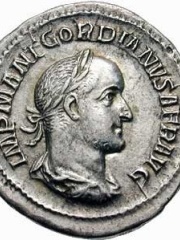
5. Gordian II (190 - 238)
With an HPI of 75.62, Gordian II is the 5th most famous Tunisian Politician. His biography has been translated into 61 different languages.
Gordian II (Latin: Marcus Antonius Gordianus Sempronianus Romanus; c. 192 – April 238) was briefly Roman emperor with his father Gordian I in 238, the Year of the Six Emperors. Seeking to overthrow Maximinus Thrax, he died in battle outside Carthage. Since he died before his father, Gordian II had the shortest recorded reign of any Roman emperor, at about 22 days.

6. Masinissa (238 BC - 148 BC)
With an HPI of 74.56, Masinissa is the 6th most famous Tunisian Politician. His biography has been translated into 44 different languages.
Masinissa (c. 238 BC – 148 BC), also spelled Massinissa, Massena and Massan, was an ancient Numidian king best known for leading a federation of Massylii Berber tribes during the Second Punic War (218–201 BC), ultimately uniting them into a kingdom that became a major regional power in North Africa. Much of what is known about Masinissa comes from Livy's History of Rome, and to a lesser extent Cicero's Scipio's Dream. As the son of a Numidian chieftain allied to Carthage, he fought against the Romans in the Second Punic War, but later switched sides upon concluding that Rome would prevail. With the support of his erstwhile enemy, he united the eastern and western Numidian tribes and founded the Kingdom of Numidia. As a Roman ally, Masinissa took part in the decisive Battle of Zama in 202 BC that effectively ended the war in Carthage's defeat; he also allowed his wife Sophonisba, a famed Carthaginian noblewoman who had influenced Numidian affairs to Carthage's benefit, to poison herself in lieu of being paraded in a triumph in Rome. After inheriting a larger, more powerful kingdom now backed by Rome, Masinissa played a decisive role in provoking Carthage into triggering the Third Punic War, which ended in the city's complete destruction, and left Numidia the sole power in northwest Africa. He ruled for 54 years until his death at age 90. He was regarded as a staunch ally of Rome, and an unusually vigorous ruler, leading troops until his death and fathering some 44 sons. His tomb in Cirta (modern-day Constantine in Algeria) bears the inscription MSNSN, read Mas'n'sen, or "Their Lord". The Greek historian Polybius, who wrote extensively about the Punic Wars and is reputed to have met Masinissa, described him as "the best man of all the kings of our time", writing that "his greatest and most divine achievement was this: Numidia had been before his time universally unproductive, and was looked upon as incapable of producing any cultivated fruits. He was the first and only man who showed that it could produce cultivated fruits just as well as any other country". In the following centuries, Numidia would become known as the breadbasket of Rome. In addition to his legacy as a major figure in the Punic Wars, Masinissa is largely viewed as an icon by the Berbers, many of whom consider him their forefather.

7. Clodius Albinus (150 - 197)
With an HPI of 73.92, Clodius Albinus is the 7th most famous Tunisian Politician. His biography has been translated into 48 different languages.
Decimus Clodius Albinus (c. 150 – 19 February 197) was a Roman imperial pretender between 193 and 197. He was proclaimed emperor by the legions in Britain and Hispania after the murder of Pertinax in 193 (known as the "Year of the Five Emperors"). Initially Albinus cooperated with another contender for the throne, Septimius Severus, but the two turned on each other in 196 and commenced a civil war. Albinus died in battle the following year.

8. Mago Barca (243 BC - 203 BC)
With an HPI of 73.63, Mago Barca is the 8th most famous Tunisian Politician. His biography has been translated into 32 different languages.
Mago Barca (Punic: 𐤌𐤂𐤍 𐤁𐤓𐤒, romanized: Magon Barqa; died 202 BC) was a Carthaginian, member of the Barcid family, who played an important role in the Second Punic War, leading forces of Carthage against the Roman Republic in Iberia and northern and central Italy. Mago was the third son of Hamilcar Barca, was the brother of Hannibal and Hasdrubal, and was the brother-in-law of Hasdrubal the Fair. Little is known about his early years, except that, unlike his brothers, he is not mentioned during the ambush in which his father was killed in 228 BC.

9. Quintus Caecilius Metellus Pius Scipio Nasica (100 BC - 46 BC)
With an HPI of 72.35, Quintus Caecilius Metellus Pius Scipio Nasica is the 9th most famous Tunisian Politician. His biography has been translated into 29 different languages.
Quintus Caecilius Metellus Pius Scipio (c. 95 – 46 BC), often referred to as Metellus Scipio, was a Roman politician and military commander. Ronald Syme called him "the last Scipio of any consequence in Roman history." He was born a member of the patrician Cornelii Scipiones family and initially named Publius Cornelius Scipio Nasica after his father. After reaching adulthood, he was adopted into the plebeian Caecilii Metelli family, taking his unusually complex final name. He was a member of the Roman Senate and held the series of increasingly powerful offices that formed the cursus honorum, culminating in the consulship of 52 BC. As an aristocratic and conservative politician, he opposed the populist policies of the First Triumvirate. During Caesar's civil war, he supported the senatorial faction led by Pompey against Julius Caesar. He used his position as proconsul of the province of Syria to raise troops for the war, then commanded them in subsequent actions. Metellus Scipio led the centre at the Battle of Pharsalus and was overall commander at the Battle of Thapsus, both defeats. Fleeing across the sea after Thapsus, he was caught at the naval Battle of Hippo Regius. Facing imminent capture, he killed himself with a stoicism that was later commended by Seneca the Younger.
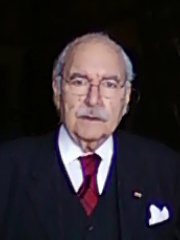
10. Fouad Mebazaa (1933 - 2025)
With an HPI of 72.12, Fouad Mebazaa is the 10th most famous Tunisian Politician. His biography has been translated into 45 different languages.
Fouad Mebazaa (Arabic: فؤاد المبزع, romanized: Fuʾād el-Mbazaʿ; 15 June 1933 – 23 April 2025) was a Tunisian politician who was the acting president of Tunisia from 15 January 2011 to 13 December 2011. He was active in Neo Destour prior to Tunisian independence, served as Minister of Youth and Sports, Minister of Public Health, and Minister of Culture and Information, and was Speaker of the Chamber of Deputies of Tunisia from 1991 to 2011.
People
Pantheon has 59 people classified as Tunisian politicians born between 471 BC and 1997. Of these 59, 18 (30.51%) of them are still alive today. The most famous living Tunisian politicians include Kais Saied, Moncef Marzouki, and Mohamed Ghannouchi. The most famous deceased Tunisian politicians include Hannibal, Aemilianus, and Zine El Abidine Ben Ali. As of April 2024, 3 new Tunisian politicians have been added to Pantheon including Sara Zaafarani, Maya Jribi, and Farès Ferjani.
Living Tunisian Politicians
Go to all RankingsKais Saied
1958 - Present
HPI: 68.62
Moncef Marzouki
1945 - Present
HPI: 68.39
Mohamed Ghannouchi
1941 - Present
HPI: 67.83
Rached Ghannouchi
1941 - Present
HPI: 63.23
Mohamed Ennaceur
1934 - Present
HPI: 62.78
Najla Bouden
1958 - Present
HPI: 62.54
Bertrand Delanoë
1950 - Present
HPI: 61.23
Hamadi Jebali
1949 - Present
HPI: 60.59
Habib Essid
1949 - Present
HPI: 57.89
Ahmed Hachani
1956 - Present
HPI: 56.75
Silvan Shalom
1958 - Present
HPI: 56.43
Ali Laarayedh
1955 - Present
HPI: 55.17
Deceased Tunisian Politicians
Go to all RankingsHannibal
247 BC - 183 BC
HPI: 86.62
Aemilianus
207 - 253
HPI: 80.53
Zine El Abidine Ben Ali
1936 - 2019
HPI: 76.34
Habib Bourguiba
1903 - 2000
HPI: 75.92
Gordian II
190 - 238
HPI: 75.62
Masinissa
238 BC - 148 BC
HPI: 74.56
Clodius Albinus
150 - 197
HPI: 73.92
Mago Barca
243 BC - 203 BC
HPI: 73.63
Quintus Caecilius Metellus Pius Scipio Nasica
100 BC - 46 BC
HPI: 72.35
Fouad Mebazaa
1933 - 2025
HPI: 72.12
Beji Caid Essebsi
1926 - 2019
HPI: 72.05
Hanno the Great
300 BC - 260 BC
HPI: 71.46
Newly Added Tunisian Politicians (2025)
Go to all RankingsSara Zaafarani
1963 - Present
HPI: 53.15
Maya Jribi
1960 - 2018
HPI: 47.00
Farès Ferjani
1997 - Present
HPI: 34.36
Overlapping Lives
Which Politicians were alive at the same time? This visualization shows the lifespans of the 17 most globally memorable Politicians since 1700.

